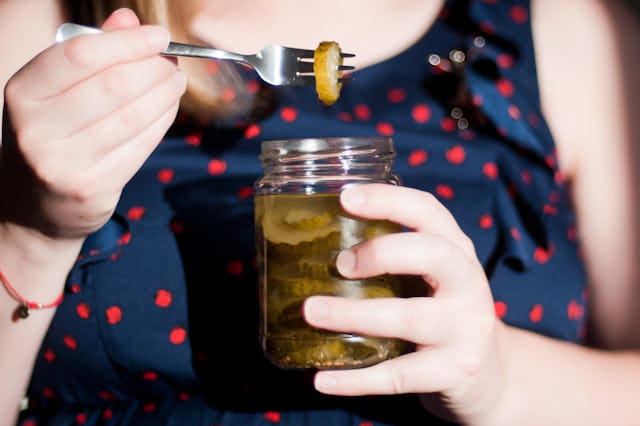Does Pickle Juice For Cramps Really Work?
An expert weighs in on whether a miracle cure for cramps is chillin’ in a jar in your fridge.

Whether you occasionally wake up in the night plagued by a painful charley horse or you’ll do anything to ease those dreaded period cramps, there’s a good chance you’ve wondered if all the TikTok videos touting pickle juice as a miracle cure have any truth to them. Turns out, it’s worth a shot if you’ve got an extra jar on hand — though there is a chance you might not find much relief, as Dr. Chris Mohr, fitness and nutrition adviser at Fortune Recommends Health, tells Scary Mommy.
“Pickle juice is widely believed to help alleviate muscle cramps quickly,” he explains. “Salt is the primary electrolyte lost in sweat and is one common cause of cramping. Therefore, the theory here is that the high salt content in pickle juice helps replenish salt lost during intense activity or dehydration, which helps with a quick recovery from muscle spasms.”
Especially in the summer months, when you might be more active and sweating up a storm just from stepping outside, anything that promises relief sounds like a dream. But this theory has an anecdotal success rate and the science is mixed, though there’s no harm in taking a swig if you find yourself suddenly, erm, in a pickle.
“For those who find relief from muscular cramps through pickle juice, the effect can be quite swift,” Mohr says. “Some may feel relief from exercise-induced muscle cramps within minutes of ingestion. However, individual experiences may vary, and more comprehensive research is needed to fully understand the efficacy and timing. Further, while sodium and electrolyte imbalances may be related to some cramps, they may not always be the issue, and overall hydration is important as well.”
As for how much pickle juice helps, most experts believe a small amount — say, a few ounces at most, would be enough to help halt muscular cramps in their tracks. But if you’re hoping to find the cure for pesky period cramps in a jar in your fridge, Mohr offers up a quick fact-check.
“Pickle juice is primarily believed to be effective for muscular cramps, such as those experienced in the legs, feet, or arms that are usually caused by exercise or other physical activity,” he says. “However, there isn’t much evidence suggesting that pickle juice would be helpful for menstrual cramps, which are caused by hormonal fluctuations and uterine contractions.”
And if your kid comes complaining about painful cramps, you’ll want to use caution, as Mohr explains.
“Pickle juice is high in sodium, so it should be consumed cautiously, especially by children and teens whose recommended daily salt intake is lower than that of adults,” he says. “Of course, if a person is exercising or active in the hot, humid weather or is a heavy sweater, their sodium requirements may be higher. While occasional use in small amounts might be safe for adults, it’s smart to consult a health care provider and, ideally, a qualified sports dietitian before regularly offering pickle juice to kids and teens to address muscle cramps since there may be other health concerns to check for.”
In fact, pickle juice shouldn’t serve as a replacement for other preventative measures, as Mohr points out. “Staying hydrated throughout the day; making sure you consume enough minerals like sodium, magnesium, and potassium; and doing proper warm-up exercises before engaging in physical activity are great strategies for preventing and managing cramps,” he says. “Further, getting acclimated to the heat is important, so start slow and don’t do too much, too soon. For immediate relief, hydrating and gently stretching the affected muscle can also be effective. Always remember to tailor any approach to suit your health needs and circumstances.”
If you or your child experience severe cramping that impacts your quality of life, checking in with your family doctor is never a bad idea. But if you’re a big fan of the briny, salty stuff (lookin’ at you, Snooki!), there’s no harm in giving it a try the next time a cramp strikes and you’re sitting near the fridge.